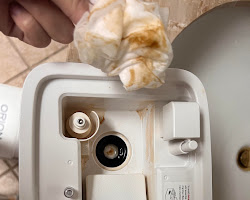Table of Contents
Vinegar Steam Inhalation: A Sinus Relief Miracle or Just Folklore?
Inhaling vinegar steam is a traditional home remedy that some people use to alleviate sinus congestion.
The steam can help moisten and soften mucus, making it easier to expel and thereby clearing the nasal passages.
However, there is limited scientific evidence to support the effectiveness of vinegar steam specifically for sinuses.
It’s important to use caution, as inhaling vinegar steam can be irritating to the respiratory tract for some individuals, particularly if done excessively or if the vinegar concentration is too high.
If you choose to try this method, it’s advisable to use a diluted vinegar solution and to discontinue use if you experience any discomfort or irritation.
Introduction
Yes It’s that time of year again. The weather is cooling off, the leaves are turning brown and starting to blow all over the place, and sinus pressure has made its grand appearance the same way it does every year during this season.
And just like clockwork, home remedies start popping up all over social media offering a easy homestyle fix, dredging up home remedies from ages past to cure congestion and head colds.
And you may think that you’ve heard them all by now, But this is one that I have never heard of to recently.
 Inhaling Vinegar Steam
Inhaling Vinegar Steam
One home remedy for clearing up congestion in your face and in your chest is the use of vinegar. More specifically the use of vinegar vapor and steam.
The ideal is to put Apple Cider Vinegar in a pot of boiling water and breathe in the steam. Another way of doing it would be to add it to your humidifier/ vaporizer.
This is a good spot to point out that it must be Apple Cider Vinegar. And that we are not talking about plain white vinegar. (more on that later)
Why does inhaling apple cider vinegar steam help clear sinuses?
Inhaling apple cider steam is a good way to irrigate the sinuses.
The main ingredient of vinegar is the substance called a acetic acid. Acetic acid is a natural microbial deterrent that can aid in the reduction and reproduction of bacteria in the sinuses.
Apple Cider Vinegar is also full of other nutrients like vitamins B,A, and E, as well as calcium and magnesium that can help reduce inflammation in the sinus cavities.
But being a home remedy, as you can guess, It does not have the wholehearted support of the medical community.
There are critics who say that breathing vinegar steam will burn your sinuses because of the acetic acid.
As with any home remedy, the best idea is to try it and if it doesn’t give you any results or worse gives you a bad reaction, then stop.
There are also proponents who absolutely swear by the use of apple cider vinegar steaming,
Vinegar in humidifier for congestion
Here are some possible benefits of inhaling apple vinegar steam:
Congestion relief: The steam can help loosen mucus, making it easier to clear from your sinuses and chest. This could ease symptoms of colds, sinusitis, and bronchitis.
Sore throat relief: The acetic acid in the vinegar may have some antibacterial and anti-inflammatory properties, which could soothe a sore throat.
Headache relief: Some people find that inhaling apple cider vinegar steam helps with sinus headaches, potentially by reducing inflammation and congestion.
Antimicrobial effects: Acetic acid may have some ability to kill bacteria and viruses, although its effectiveness in the context of steam inhalation is unclear.
And like we said, being this is a home remedy, there is not much scientific evidence to back it up. So you should do your own research and start slow.
 Inhaling White Vinegar Steam
Inhaling White Vinegar Steam
Inhaling white vinegar steam is not the same as inhaling apple cider vinegar steam.
And it is not recommended for inhaling as a remedy for congestion and colds.
White vinegar is made with grain and basically is fermented alcohol. That is one of the reasons why it is so effective as a cleaning solution or additive. It is also good for killing weeds and deterring insects.
And unlike apple cider vinegar, it does not have the enzymes and vitamins that can account for the medicinal properties of apple cider vinegar.
But when you consider the fact that it is good as a weed killer, I’d probably would rather just go with the apple cider vinegar rather than mess around with something that could be potentially harmful.
(But people drink soda all day long. And it is well known that you can clean corrosion off your vehicles battery post with soda as well as get the ring out of your toilet with it. So you be the judge.)
Adding Vinegar to the Water of a Humidifier
Cleaning a humidifier with vinegar is well known to be one of the best ways to do so. It is also one of the most popular natural substances that is known to remove mold and inhibit its production.
But what about adding vinegar to the water of a humidifier while it is being operated?
Though there are a few proponents of adding vinegar to a humidifier for ongoing cleaning, it’s generally not recommended by humidifier manufacturers.
Here’s why:
 Acidity damage: Vinegar’s acidity can corrode metal parts, causing leaks and shortening the appliance’s lifespan.
Acidity damage: Vinegar’s acidity can corrode metal parts, causing leaks and shortening the appliance’s lifespan.
Mineral buildup: While vinegar initially dissolves buildup, its regular use can encourage a harder-to-remove, white, crusty substance.
 Irritating smell: Even small amounts of vinegar can make the humidified air unpleasant and potentially irritate lungs or eyes, especially for individuals with sensitive airways or asthma.
Irritating smell: Even small amounts of vinegar can make the humidified air unpleasant and potentially irritate lungs or eyes, especially for individuals with sensitive airways or asthma.
Ineffective cleaning: Vinegar in water won’t reach all parts of the humidifier, like narrow crevices or the base, requiring additional deep cleaning with vinegar solution and thorough rinsing.
So even though cleaning a humidifier would vinegar is a great idea, using distilled water and changing it out regularly to keep it from stagnating, is a better method for ongoing cleaning.
Recap
Inhaling vinegar steam, more specifically apple cider vinegar steam is an old country remedy to relieve head and chest congestion.
Many people already keep water boiling in the winter to help alleviate symptoms caused by dry air.
Apple cider vinegar makes a great additive to the boiling water because of the enzymes and nutrients found in it can help with sinus inflammation and clearing.
But not all vinegar is the same. Apple cider vinegar is known for its medicinal properties and vitamins.
Distilled vinegar or white vinegar does not have the same nutrients and could be more acidic as a steam. Do not try this try this home remedy with White Vinegar.
The main ingredient in vinegar is acetic acid.
Critics of using vinegar as a steam to clear out the sinuses usually note that acetic acid can be too strong and burn the sinuses.
Remember, if you’re going to try inhaling vinegar steam to clear out your sinuses, it’s better to crawl before you walk, so try it out slowly.
Here are some additional things to keep in mind:
- dilute the vinegar with water (about 1/4 cup vinegar to 2 cups water).
- Don’t breathe in the steam for too long, start with a few minutes and see how you react.
- Use a bowl and towel to create a tent over your head while inhaling the steam.
- Stop immediately if you experience any irritation or discomfort.
A little dab will do you.


 Inhaling White Vinegar Steam
Inhaling White Vinegar Steam